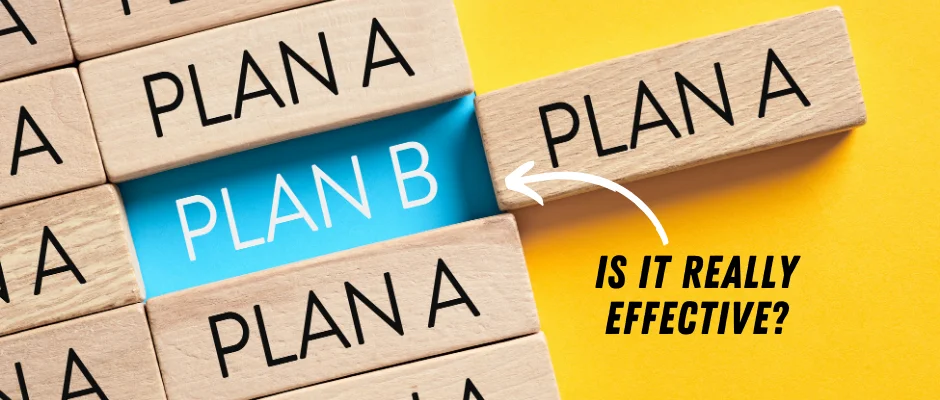
Plan B Effectivity
Sometimes you need a plan B.
Plan B is the #1 physician- and pharmacist-recommended brand* of emergency contraceptive in Canada. If your question about Plan B is not answered in the list below, speak to your healthcare professional for more information.
I’ve had unprotected sex. Am I likely to get pregnant?
You can get pregnant at any time during your monthly cycle—from the start of one period to the beginning of the next. Although people talk about a “safe time of the month,” it’s hard to tell when this is, for many reasons. Your most fertile time of the month is when you’re ovulating (producing an egg), but most women aren’t aware when this is happening. Also, it takes several days for an egg to make its way from the ovary down the fallopian tube, and an egg can be fertilized at any point during this journey. Sperm can survive in a woman’s body for up to seven days, so even if you hadn’t ovulated when you had sex, the sperm could still fertilize the egg sometime afterwards.
Many women don’t have regular periods. The time between your periods can vary, depending on what’s happening in your life, whether you’re stressed, and whether or not you’re eating properly. This makes it even more difficult to calculate your “safe” time.
When accidents happen, such as a condom breaking, and you don’t want to get pregnant, emergency contraception is there as a plan B. It’s not something you should use regularly, and you should never think of it as an alternative to a long-term method of birth control.
Is Plan B an abortion pill?
Absolutely not. It may be comforting to know that Plan B does not work if you are already pregnant (a fertilized egg has attached to the wall of the uterus). So if you take Plan B, you will not be terminating a pregnancy.
If you already have a confirmed pregnancy, you should not use Plan B because it will not be effective.
What Is Plan B?
Also known as the original morning-after pill, Plan B is designed to be used when your usual birth control method has failed or been forgotten and you don’t want to get pregnant. Whether you’ve missed a few pills, the condom broke or slipped off, or you forgot to insert your diaphragm, you can choose Plan B as a form of emergency contraception.
Plan B can be taken up to 72 hours after unprotected sex, but the sooner you take it, the more effective it is.
I forgot my pill. What should I do?
If you forgot to take one of your oral contraceptive pills for more than a 24-hour period and you engaged in unprotected intercourse during the day of the missed pill or within five days before the missed pill, consider taking Plan B to prevent an unwanted pregnancy.
How do I restart my birth control pills?
If you’ve taken Plan B because of missed birth control pills, start your birth control pills right away and remember to use another method of contraception, such as condoms, until your birth control is fully reliable again.
Will Plan B affect my period?
Plan B has no long-term effect on your menstrual cycle. Most women will get their next period when expected, and their cycle will continue as normal. For some women, their period can come earlier or later than usual and be lighter or heavier. If your period is delayed more than a week, or if you have any other cause for concern, contact your healthcare professional. More than occasional use (more than once within a menstrual cycle or more than once a month) may impact your menstrual cycle. You may also experience a few days of spotting after taking Plan B, which is normal.
What Effect To Expect From Plan B
Although few women experience vomiting with Plan B, if you vomit within two hours of taking Plan B, you might not have absorbed the medication contained in the pill. Call your healthcare professional, as you might need another dose.
After you’ve taken Plan B, you should get your next period at the expected time, or a few days early or late. You may experience spotting a few days after taking Plan B, but this is not your period.
While you’re waiting for your next period, abstain from having unprotected intercourse or make sure to use a contraceptive.
If you’ve taken Plan B because of missed birth control pills, start your birth control pills right away and remember to use another method of contraception, such as condoms, until your birth control is fully reliable again.
What will happen at the pharmacy?
In a province or territory where Plan B is kept over the counter, you will find it in one of the following sections: Birth Control, Contraceptives, Feminine Hygiene, or Family Planning.
In Québec where Plan B is kept behind the pharmacy counter, the pharmacist may ask you a few simple questions before giving you, or prescribing you (in Québec), Plan B to ensure it’s right for you. These professionals have been trained to handle requests for emergency contraception sympathetically and confidentially. In some cases, your pharmacist may refer you to a doctor or clinic for emergency contraception instead.
How often can I take Plan B?
Plan B should only be used in emergencies and not on a regular basis. It can also be used more than once. However, if Plan B is used on more than one occasion, the cumulative pregnancy rate will be higher.
Remember that it should never replace regular, long-term methods of contraception. The pregnancy rate of Plan B is calculated for a single use. If Plan B is used on more than one occasion, the cumulative pregnancy rate will be higher. Also, if Plan B is taken more than once within a menstrual cycle, or taken once a month more than occasionally, it may impact your period.
Do I need a prescription for Plan B?
Plan B is available at pharmacies across Canada without a prescription from your doctor. Plan B is available over the counter in Alberta, British Columbia, Manitoba, New Brunswick, Newfoundland and Labrador, Nova Scotia, Nunavut, the Northwest Territories, Ontario, Prince Edward Island, Saskatchewan, and Yukon. It can be found in any of these sections of your pharmacy: Birth Control, Contraceptives, Feminine Hygiene, or Family Planning. It is available under prescription by your pharmacist in Québec.
How does Plan B work?
Plan B is a levonorgestrel emergency contraceptive, available in a one-pill (1.5 mg) dose. It works by temporarily stopping the release of an egg from the ovary.
How long is Plan B effective?
The sooner you take Plan B, the more effective it is. It can prevent pregnancy if taken within 72 hours and preferably within 12 hours of unprotected sex. If you take it within 24 hours of unprotected sex, it is 95% effective. If you take it between 48 and 72 hours of unprotected sex, the efficacy rate is 61%. Note that if Plan B is used on more than one occasion, the cumulative pregnancy rate will be higher.
What are some of the side effects of the Plan B morning-after pill?
Severe reactions to Plan B are uncommon. Temporary side effects, however, may occur and usually pass within 24 hours. The most common side effects include nausea, abdominal pain, fatigue, headache, dizziness, breast tenderness, vomiting, diarrhea, and irregular menstrual bleeding. Less common reactions are migraine or severe headache, lower abdominal pain, painful menstruation, and vaginal discharge. If your period is more than a week late or if these symptoms continue for more than 48 hours or are severe, see a healthcare professional.
Be sure to contact a healthcare professional immediately if you experience any of the following serious side effects: itching and rash, cramping or severe pain in your stomach or belly before your next normal period, uterine hemorrhage, vaginal hemorrhage. If you vomit within two hours of taking Plan B, you may need to take another dose.
Is there a weight limit for Plan B?
If you have had unprotected sex or a contraceptive accident, emergency contraception should be taken as soon as possible to prevent pregnancy. Although there is some data that levonorgestrel (the main ingredient in Plan B) may be less effective in women with increasing weight or higher BMI (body mass index), the data is limited and inconclusive. If you have any questions about this, please speak to your healthcare provider.
Where can I find more information?
If you have any questions, you can call the Plan B medical information line toll-free at 1‑888‑919‑0782 (Canadian residents only).

.webp)
Leave a message